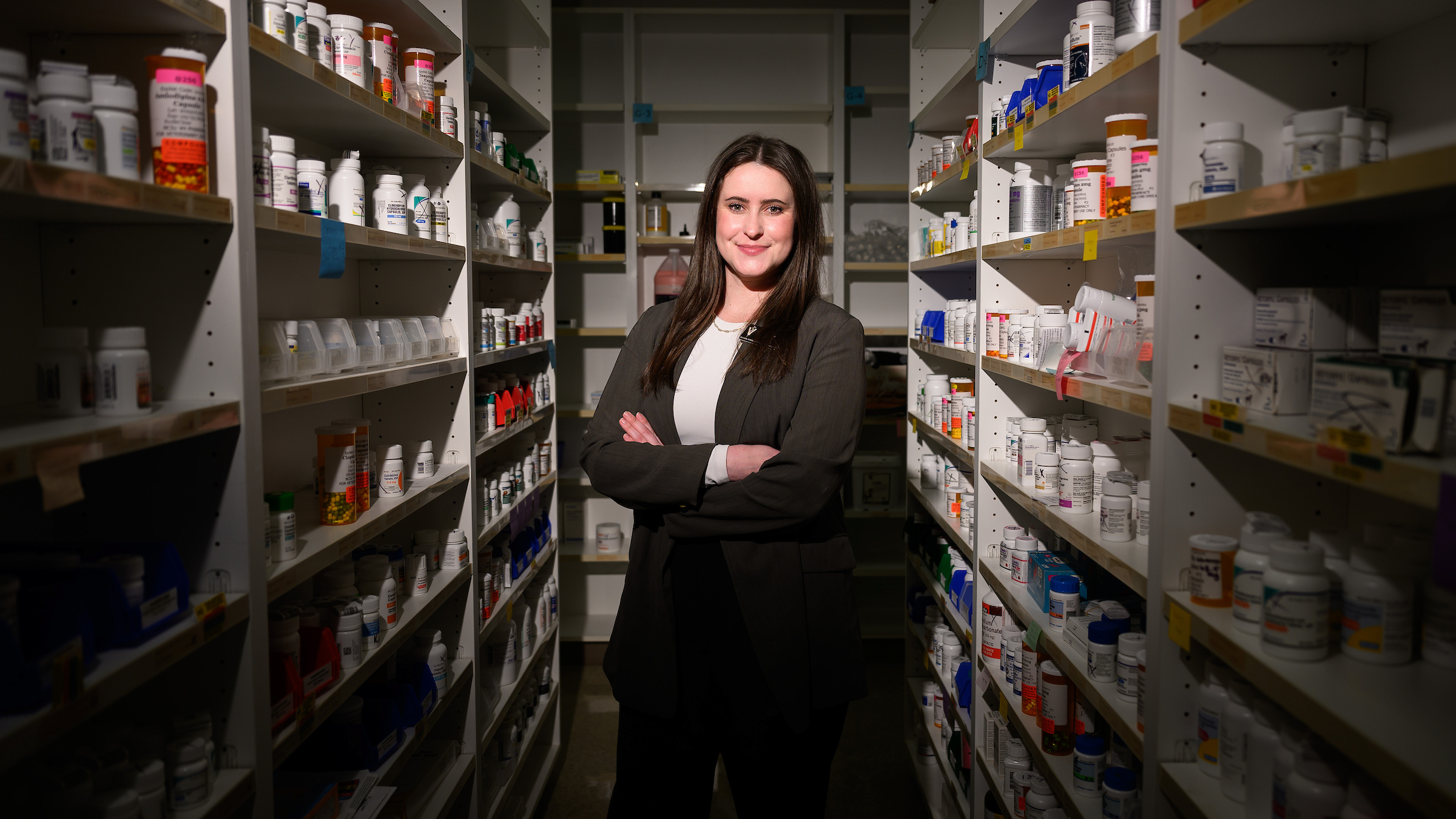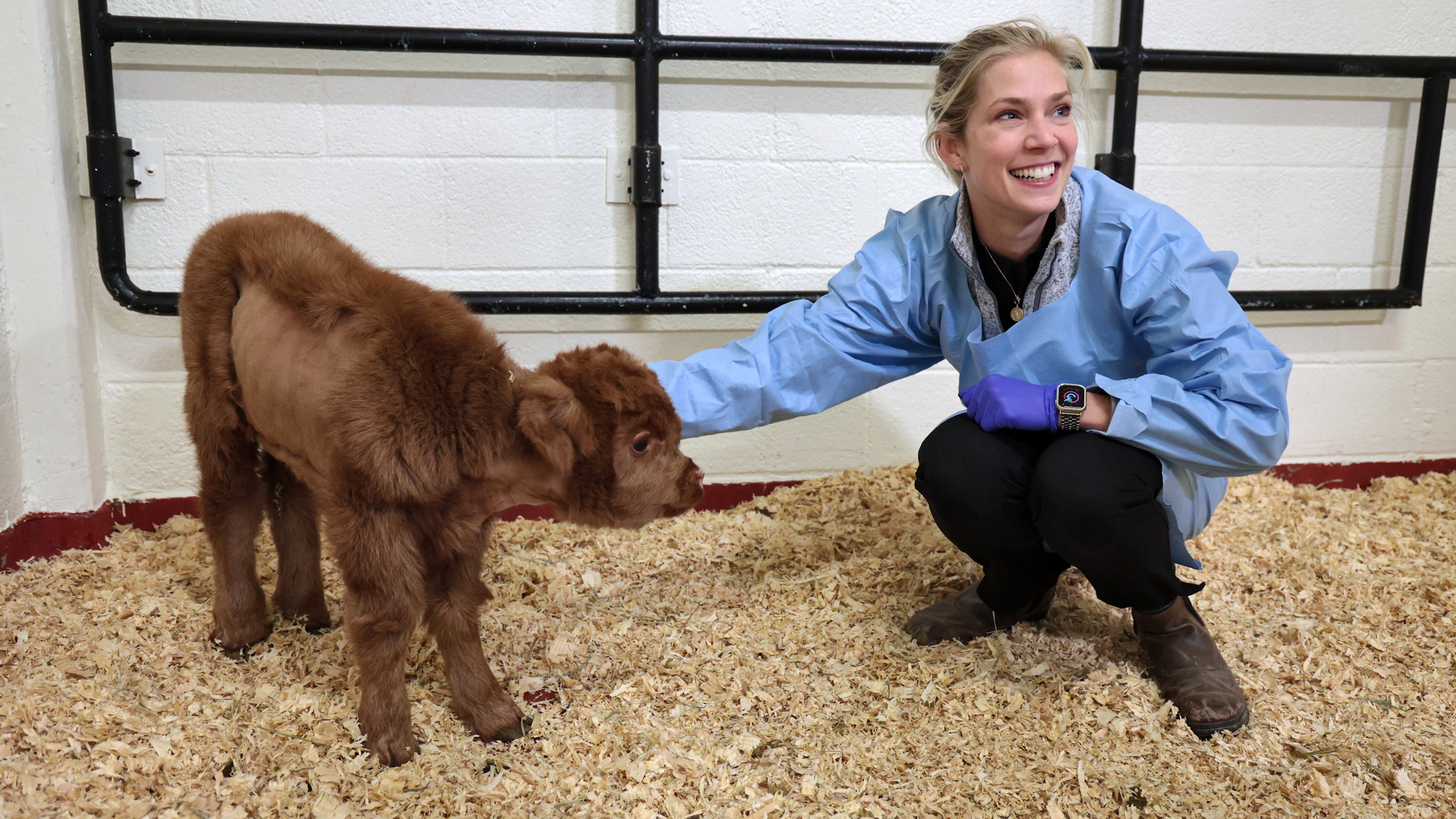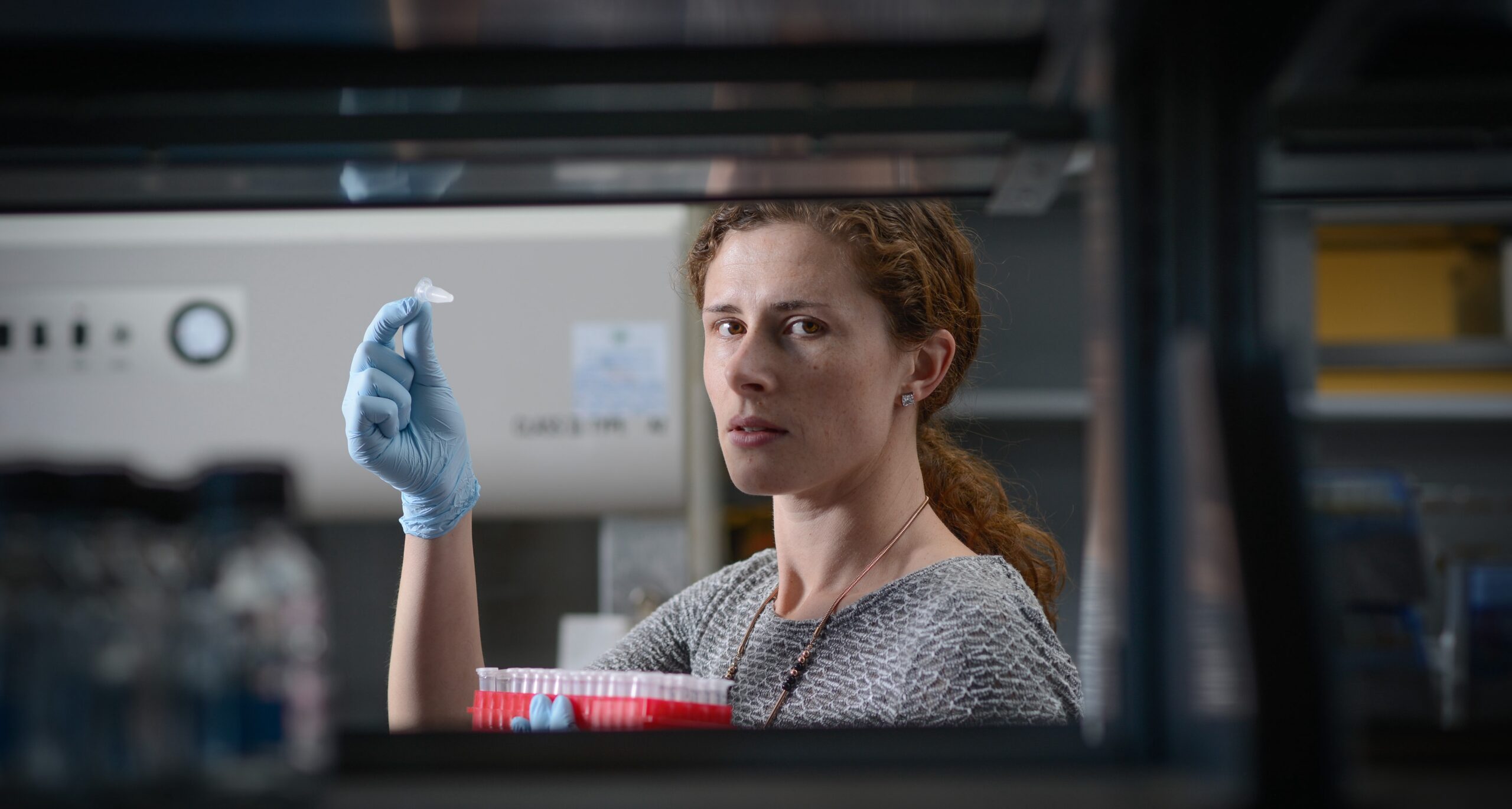Q&A: Director Sid Thakur on How NC State’s Global Health Program is Changing the World
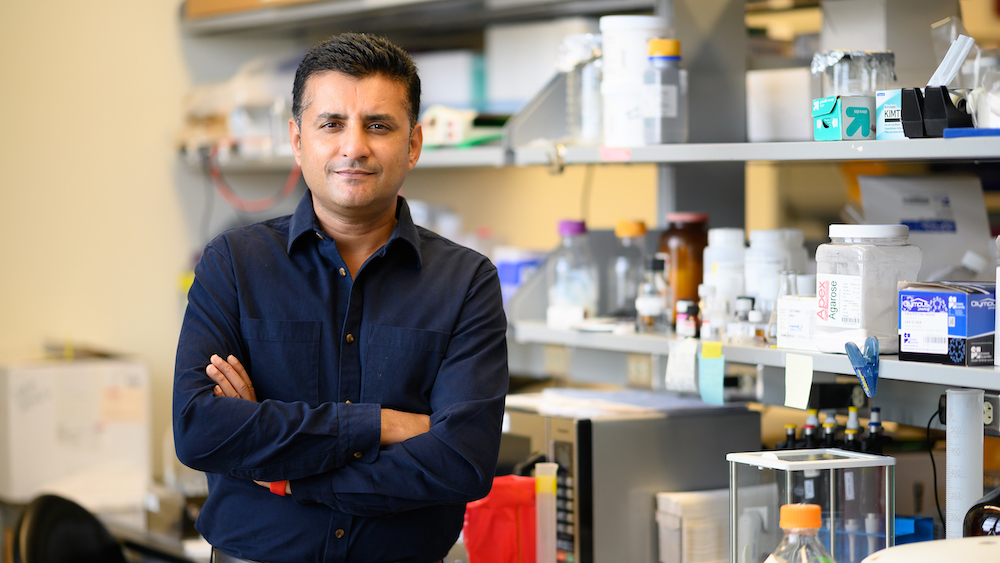
Over the past 30 years, the NC State College of Veterinary Medicine has changed — and saved — countless lives. More recently, the college’s work in global health has drastically extended its reach, in everything from understanding infectious disease and tracking outbreaks to training a new generation who are redefining the role veterinarians play in an interconnected world.
Two years ago, the CVM bolstered its impact by combining its global health education and global health research programs under one dynamic umbrella. Led by director Sid Thakur, the program raises NC State’s profile in the global health realm by conducting groundbreaking international research, collaborating with peer institutions and training scientists around the world.
It’s just the beginning. Thakur talked to us about the importance of veterinarians to global health, the program’s plans for the future and why he’s optimistic that NC State can make a real difference in addressing the world’s most pressing health challenges.
In the two years since we announced our new vision for the global health program, there have been stark reminders of the importance of the world coming together to improve health. How is the college making strong impacts on global health?
Our mission statement defines our mandate — bringing everybody together to address global challenges. The college tackled many global health issues before the formal establishment of the program, but we wanted to encourage collaboration. We know how to solve global problems, and we have a tremendous amount of expertise, but we have to work together.
The result of our efforts in the past two years is clear with the multidisciplinary approach that we are taking. We’re building collaborations across the university and outside the university. Students are very enthusiastic about earning certificates in global health. It’s a concerted effort.
How do you define global health in the context of veterinary medicine?
The classic definition of global health is health for all and health equity for all. And when we say health equity, we’re not just focusing on human health. Our role is primarily for animal health, but animal and human health are interrelated because we also share the environment. You cannot help human health and ignore animal health.
Look at the world’s growing population —10 billion people in a couple of decades. We have to increase our current agricultural production by 70% or more to feed that ever-growing world. We can’t do that without having healthy animals. Food security is an integral aspect of what we are doing now and how we are doing it, especially in terms of controlling the pathogens that impact these animals and also humans.
We can target these issues of hunger and nutrition and animal health all together. A key aspect of that work is our students. We are training our veterinarians to really understand these global challenges from a holistic point of view, not just by working in a clinical setting, but going to different parts of the world and gaining cultural competency. They see different cases that they will never see here in the United States. The COVID-19 pandemic has shown us how important it is to have that perspective.
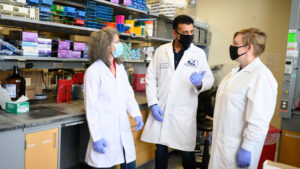
What are some current projects that showcase that important role?
We are deeply involved in addressing these challenges. A new project with UNC-Chapel Hill in Malawi is focused on infectious disease and antimicrobial resistance training. We are working on food production and issues with wastewater that animals and humans get exposed to in Senegal. Those are all very important and they are also very large, complex problems to solve. There is no silver bullet.
What is it like leading such a dynamic team?
When we tackle these global problems, we look at who has the expertise to solve them, and we don’t have to really look far. They’re here at the CVM.
The experience of Andy Stringer, assistant professor of veterinary global and public health, is exceptional, having worked for many years at a nonprofit, the Health and Livelihoods group, and chairing the Triangle Global Health Consortium. The global health education program grows stronger under his leadership every year.
Greer Arthur, our global health program specialist, acts as such a vital connection between the program and our faculty and students. We work on ideas together, and we’re also always open to ideas. We also work closely with Senior Associate Dean for Research and Graduate Studies Kate Meurs, who has been a strong supporter of our efforts.
What are the areas you see as us making the strongest difference so far?
Becoming a World Health Organization Collaborating Center focusing on drug resistance and one health is a big one. That has to do with the leadership shown by the head of the CVM’s Department of Population Health and Pathobiology Dr. Paula Cray.
We are home to three national pathogen surveillance programs. That has been noticed by these global agencies, like WHO. Now, we are one of just 18 collaborating centers in the world working on antimicrobial resistance.
We are leading efforts across the world in terms of training for antimicrobial surveillance. Overall, we’re expanding the perception of what we do. There are faculty working across the globe — India, China, Brazil, the Galápagos Islands. There’s a very clear understanding, not just within the college or at NC state but outside as well, that the CVM is emerging as a strong leader in global health.
What have been some of the other areas of focus?
The CVM has been working in the areas of antimicrobial resistance and food security for many years; they are two of our real strengths. Mathematical modeling of pathogenic transmission is another important aspect for us. Gastrointestinal biology is very important for us, especially when considering nutrition and food security, especially in low- and middle-income countries.
We have expanded our ability to attract world scholars for training at the CVM. Just over the last five years, we have been able to train more than 30 visiting scholars.
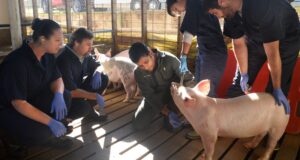
How does the training aspect of the program elevate equity in global health?
Even though we have made so many advances across the world, there are still many countries that don’t have access to technology that can really help them tackle some of these global challenges in their own countries.
What we are really doing is taking skills to the next level. Scholars come over here, are trained and then go back to their countries and use what they’ve learned. Dr. Mabel Aworh is a good example. She came over here from Nigeria for four months and that partnership has led to two publications. A third one is about to be published, and we are on track to submit a National Institutes of Health proposal.
And then we also have our own students. We offer our own certificate in global health and there’s the master’s of public health with a global health program that’s a collaboration with UNC-Chapel Hill. There are many DVM courses with a global health focus. What can students interested in global health expect when they come to the CVM?
Many students come here to focus on companion animal medicine, but I’ve been here for 13 years and I’ve started to see students get more and more interested in public health and global health.
We have dual DVM/Ph.D. students who have done research in Sri Lanka, students who have goals to become epidemiologists with the Centers for Disease Control, who want to do public global health work through the United States military.
There are really exciting opportunities. CVM’s global health education program gives students a deep understanding of global health that leads to them coming up with new approaches to solving problems.
We see how these students after they come back from long, on-the-ground research in different countries, return with new perspectives and new passions that they may not have had when they joined our DVM program.
What led you to start your own global health research? Why were you interested in it?
When I started pursuing my degree in veterinary science in India, I was exploring different areas to focus on. I wanted to be a clinician, but research was always interesting and important to me. I got into the Indian Veterinary Research Institute, and that’s where I really started to blend the concepts of veterinary and public health. Once I got into antimicrobial resistance research, I said, this is it. This is for me.
What clicked for you?
I just felt comfortable. I felt like this was something that allowed me to focus on the veterinary side, but the human side also. For me, that has been a driving force: If I can improve animal health and if I can improve human health, I want to do both.

What helps you stay positive about the future of global health? What keeps you hopeful?
We have to stay positive, especially now as we face the COVID pandemic. History has shown the power of that. We have faced so many challenges that we thought were insurmountable, but we have overcome those.
We once had no concept of what a vaccine is, but we are still here, right? We have gone through two world wars. When I look at the CVM global program, I see a lot of positives. I think we are creating momentum. We need to keep going forward now.
That really resonates in the time we’re currently living in.
We are not the answer to all of the problems. I think in some areas we are definitely strong players, and we can take our work to the next level. But it’s a struggle now. Now 400,000 people within the United States have died from COVID-19, but researchers like us are continuing to work hard to find a solution. So we have to stay positive. You have to keep fighting, but we also have to work together.
That optimism is carried by our students and visiting scholars as well. They wouldn’t be coming to us if they weren’t optimistic about the difference they could make.
Yes, definitely. The reason the visiting scholars come over here is that they can see the challenges their countries are facing on a daily basis. When they return, they have a step-up to start really tackling these pressing issues.
Over the next five or 10 years, what do you see as the most pressing global health issues we need to tackle?
It circles back to the strengths we have in antimicrobial resistance and food security for us. COVID is here, but antimicrobial resistance is here to stay. The projection is that by 2050 deaths caused by AMR will overtake the number caused by cancer because we don’t have good solutions for it. No new drugs are out because of the resistance problem.
I think that’s where a lot of our focus has to be, not just in terms of research, but collaborating with, say, the chemistry of life program at NC State that’s looking at small molecule drug discoveries to target infectious pathogens. That is one area that I think we will definitely play a major role in.
Food security goes hand in hand with that. We are doing the surveillance work, and a lot of it is focused on the animal side. You can’t solve the AMR issue by not focusing on animal health. If animals are not doing well, the availability of food to the world is impacted and so is human health.

What do you think our global health program will look like in five or 10 years? What can we offer to the world that is unlike anywhere else?
I definitely look at us being even more of a leader in training and securing more training grants. I anticipate that our research program will have more faculty who are driven by earning those grants for international work. In terms of biomedical research, that’s going to be very important.
The first question a lot of people ask me is, ‘Why do you want a global program at NC State?’ Well, we have a College of Veterinary Medicine for starters. We have a College of Textiles. We have a robust College of Engineering. There are some very unique things within NC State.
So I hope in the next five, 10, 15 years, we have a program within the university where we bring everybody together and then work together as a team, not as individual departments.
Is global health work personal for you?
With my food security and AMR research, yes, absolutely. At some level it has to be personal. I’m from India. There’s a lot of challenges in India including the availability of antimicrobials without a prescription. Accessibility to drugs is a problem. So yes, it is. It is personal. You have to really believe in it.
You can’t just do it because there’s funding available or it looks good. You have to believe in it. And the key thing is that yes, you can make a difference.
If you can save one life, I think that’s a job well done.
~Jordan Bartel/NC State Veterinary Medicine
Read the spring 2021 edition of our magazine, The Oath, focused on global health work at the college:
